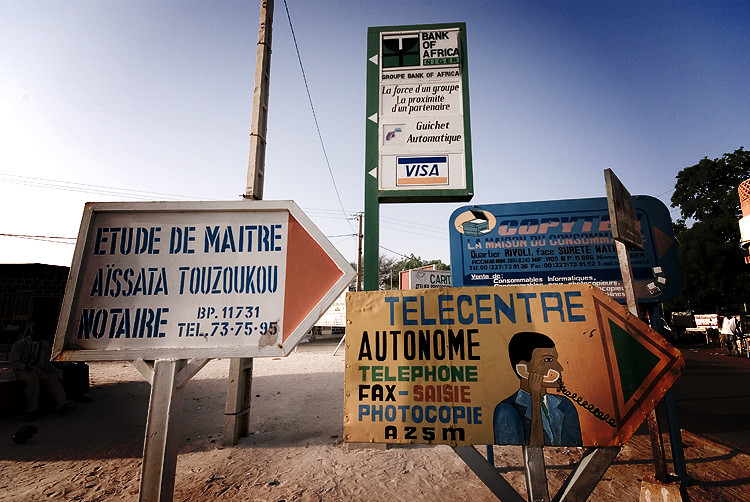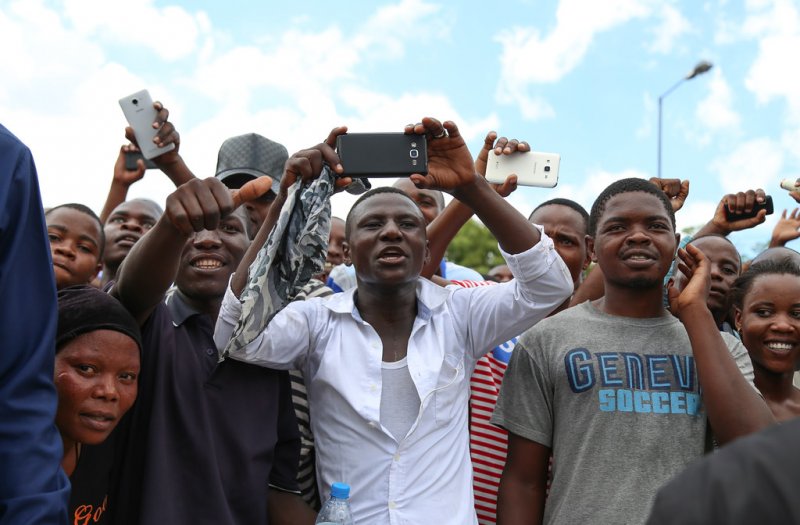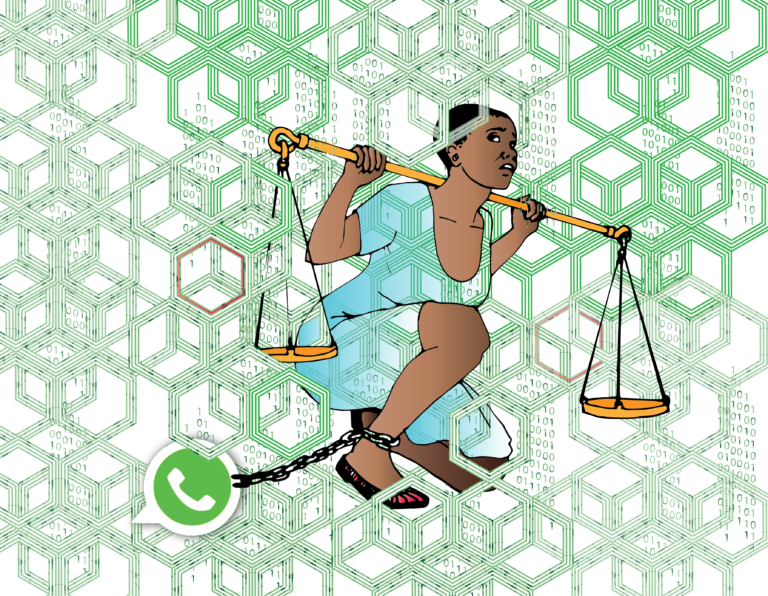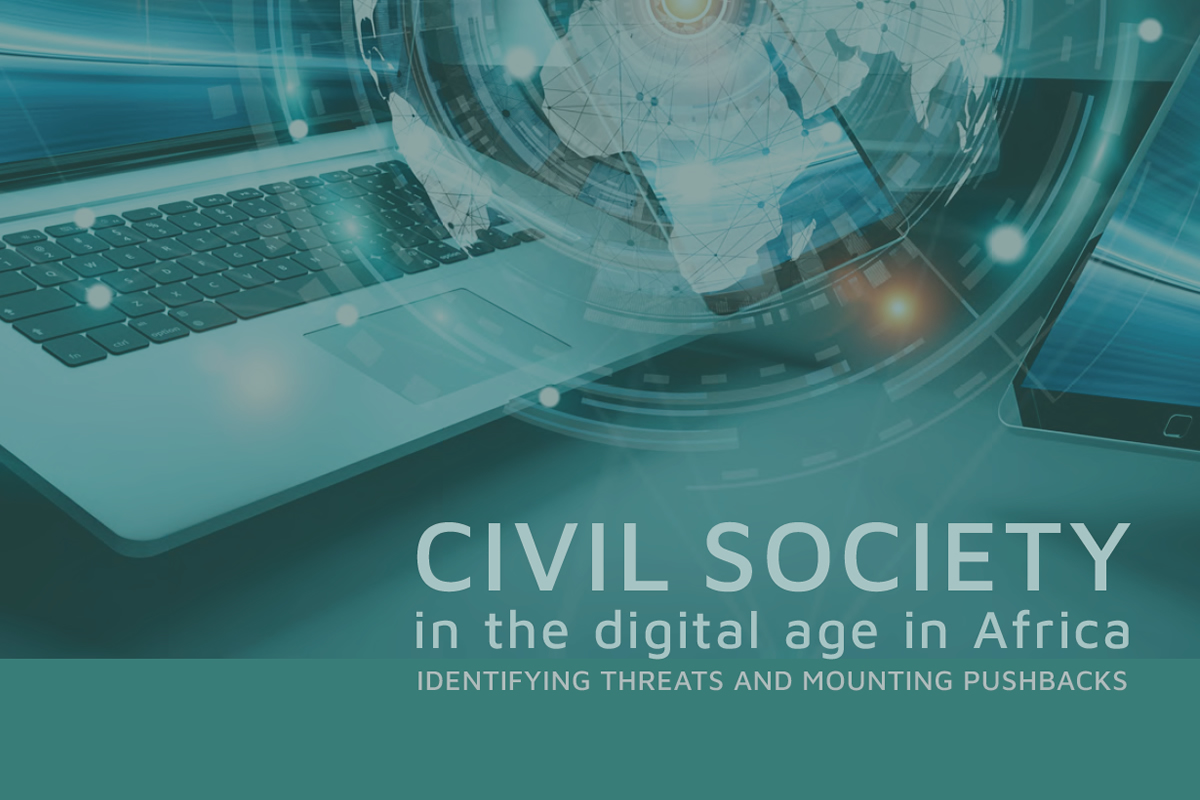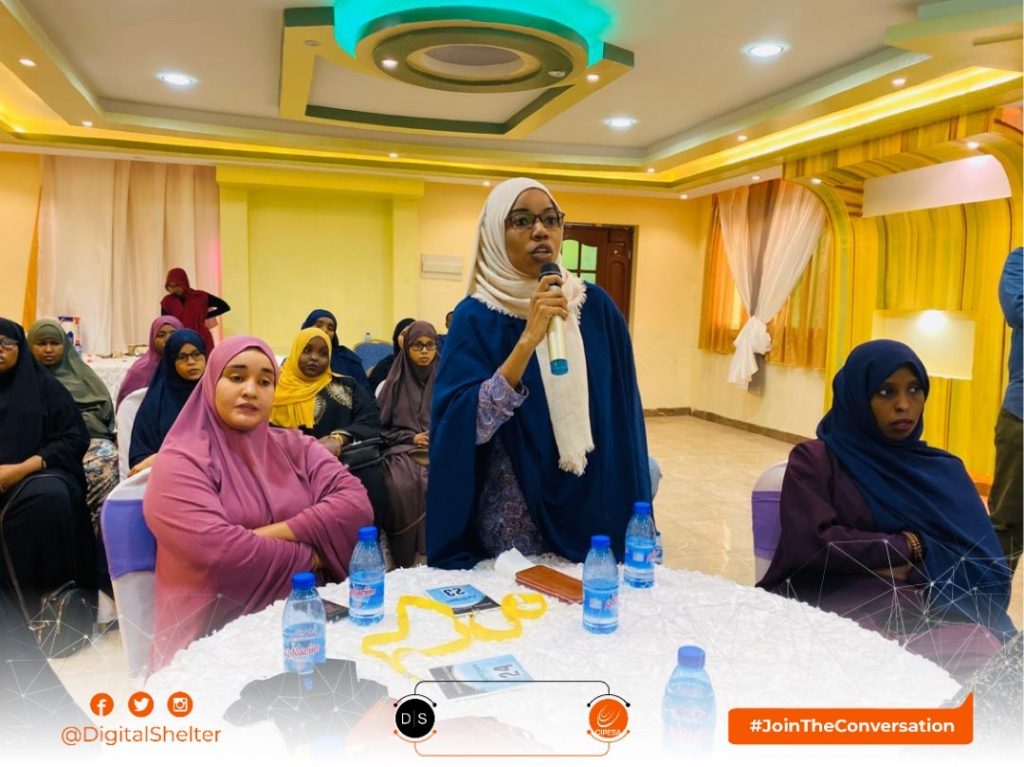Par Simone Toussi et Thomas Robertson |
Face aux problèmes de la sécurité nationale liée au terrorisme, au conflit ethnique, et au crime organisée, le Niger a promulgué une nouvelle loi sur l’interception des communications électroniques, avec des ramifications qui menacent la liberté d’expression et le droit à la vie privée en ligne.
En avril 2020, le Conseil des Ministres nigérien a déposé un projet de loi visant à sécuriser une base légitime pour «les interceptions des communications émises par voie électronique en vue de la recherche des renseignements intéressant la sécurité nationale» (Exposé de Motifs). Le 29 mai, l’Assemblé nationale a adopté à l’unanimité le projet de loi, alors que l’opposition politique a boycotté le vote, arguant que cette loi autorise la surveillance généralisée de communication «sous de fallacieux prétextes, autres que ceux relatifs à la sécurité et la lutte antiterroriste.» Malgré le boycott, le projet de loi est devenu loi en vertu de l’article 58 de la constitution nigérienne, qui spécifie que si un projet de loi reçoit le vote de la majorité absolue à l’Assemblé nationale, il est promulgué immédiatement sauf dans le cas d’un veto présidentiel, ce qui n’a pas eu lieu.
Contexte de sécurité régionale
Le Niger fait partie de la région sahélienne d’Afrique de l’ouest, où les programmes de lutte contre le terrorisme malavisés ont disproportionnellement conduit à la stigmatisation sociale et la violence contre les communautés marginalisées peules. Depuis le début de 2020, plus de 150 personnes, principalement les hommes peuls, ont disparus ou ont été victimes des exécutions extrajudiciaires par les forces de sécurité nigériennes. Le Burkina Faso voisin a été dénoncé aussi pour la cruauté avec laquelle les milices de l’État ont travaillé aux régions peuls, dont l’exécution extrajudiciaire de 12 hommes et l’enquête subséquente que les acteurs de la société civile ont largement critiqué. Bien que le Burkina Faso ne soit pas engagé à l’interception de communication, une loi de 2019 punit les organes de presse qui critiquent les forces de défense burkinabés. Pendant ce temps, le Mali qui partage également une frontière avec Niger, a adopté une loi sur la cybercriminalité en 2019 qui prévoit la surveillance en temps réel par l’interception des communications. Cette loi nouvelle, qui donne l’accès gouvernemental aux données de communication numérique, peut encore aggraver la violence injustifiée actuelle de l’État contre les communautés ethniques à travers le Sahel.
L’autoritarisme numérique
La nouvelle loi entre en vigueur dans le contexte d’un cadre réglementaire qui déjà empiète sur la liberté d’expression des citoyens nigériens. La loi du pays sur la cybercriminalité adoptée en juin 2019 criminalise «le fait pour une personne de produire, de mettre à la disposition d’autrui ou de diffuser des données de nature à troubler l’ordre public ou à porter atteinte à la dignité humaine par le biais d’un système d’information» (Article 31). Cet article était la base d’une répression sur la liberté d’expression en ligne, dont l’arrestation d’une dizaine d’activistes entre mars et avril 2020 après que l’Etat ait intercepté leurs communications critiquant le gouvernement sur WhatsApp et Facebook. En 2016, un militant a été condamné de «complot visant à renverser le pouvoir» après avoir utilisé Facebook pour critiquer l’action antiterroriste du président nigérien Mahamadou Issoufou.
La loi sur l’interception des communications électroniques tente «de concilier l’exercice de cette liberté [d’accéder à l’information] avec les impératifs de sécurité nationale dans un contexte de lutte contre le terrorisme et la criminalité organisée » (Exposé de Motifs). Elle viole cependant les principes démocratiques en accordant des pouvoirs considérables à l’exécutif du gouvernement. En vertu de l’article 2, seuls le Président, le Premier Ministre, le Ministre de la Défense, le Ministre de l’Intérieur, le Ministre de la Justice, et le Ministre des Douanes sont autorisés de commander une interception de communication. Par ailleurs, selon l’article 6, la commission crée pour superviser l’exécution de la loi – la Commission Nationale de Contrôle des Interceptions de Sécurité (CNCIS) – est composée de sept représentants du gouvernement, à tous ceux qui ont désigné par les membres du cabinet présidentiel.
Selon l’Union international des télécommunications, le taux de pénétration d’internet du Niger était 5,25% en 2018. Ce taux compte parmi les plus faibles au monde, et en Afrique où l’accès à l’Internet n’est plus faible qu’au Burundi, en République Centrafricaine, en Erythrée, en Guinée-Bissau et en Somalie.
Sur le plan de la liberté de la presse, le Niger est dans une situation grave avec la répression actuelle sur la dissidence. En effet, malgré les dispositions législatives en faveur de la liberté des médias sous la loi portant liberté de la presse (Ordonnance 2010-35), le Niger a des antécédents défavorables quant au traitement des médias indépendants comme souligné ci-dessus concernant l’exécution de l’article 31 de la loi sur la cybercriminalité. L’arrestation des journalistes sur des accusations motivées par des considérations politiques est banal, et le COVID-19 a aussi contribué à l’application de la loi contre les journalistes. Par exemple, en mars 2020, Mamane Kaka Touda a été arrêté et détenu pour trois semaines à cause de ses publications sur les réseaux sociaux au sujet d’un cas suspect de COVID-19 dans un hôpital nigérien.
En outre, le rang du Niger sur l’indice de développement humain 2018 a été 189ème sur les 189 pays examinés. Ces indicateurs amènent à se demander pourquoi le gouvernement nigérien se concentre sur la surveillance numérique alors que l’accès à l’Internet est déjà disparate, et que des problèmes de développement socioéconomique plus immédiats menacent le peuple nigérien.
Avec les élections présidentielles imminentes fixée pour décembre 2020, en réalité, l’adoption des lois restrictives liées à l’usage de la technologie par le citoyen suit une logique particulière aux gouvernements autoritaires africains selon un rapport de 2019 sur les dimensions techno-politiques des interruptions d’Internet en Afrique.
La vie privée menacée
La loi sur l’interception des communications électroniques dans son ensemble viole l’article 29 de la constitution nigérienne, qui assure le secret des correspondances et des communications. L’article 2 circonscrit les contours de l’interception: «atteinte à la sûreté de l’Etat et à l’unité nationale, atteinte à la défense nationale et à l’intégrité territoriale, prévention et lutte contre le terrorisme et la criminalité transnationale organisée, et prévention de toute forme d’ingérence étrangère et intelligence avec l’ennemi.» Comme les caractéristiques spécifiques et la nature des communications entrant dans ces grandes catégories ne sont pas définies, cet article peut exposer les citoyens nigériens à la surveillance permanente. De plus, les articles 24, 32, et 33 exigent aux agents publics, aux operateurs de reseaux et aux fournisseurs de services de coopérer avec les opérations d’interception, dont la défaillance entraînerait l’emprisonnement pour une durée d’un à cinq ans et une amende de deux à dix million francs CFA (USD 3 445 à 17 222).
Bien que la loi prévoit en apparence une surveillance indépendante, l’opération d’interception est susceptible de porter atteinte à la vie privée. L’article 11 spécifie que les enregistrements liés à l’interception sont détruits sur l’ordre du président et expirent un mois après que l’ordre d’intercepter les communications soit donné, et les rapports d’enquête sur l’exploitation de l’interception rédigés. L’article 12 peut cependant permettre la sauvegarde prolongée des enregistrements de l’interception pour une durée indéterminée, spécifiant que «les transcriptions d’interceptions doivent être détruites dès que leur conservation n’est plus indispensable à la réalisation des fins mentionnés à l’article 2 [atteinte à la sûreté d’Etat, etc.]» et «il est dressé procès-verbal de l’opération de destruction.»
Avec cette nouvelle loi et la loi sur la cybercriminalité, le Niger rejoint la horde des pays africains dont le Cameroun, le Tchad, le Nigéria et la Tanzanie qui utilise la sécurité nationale comme prétexte pour introduire les législations qui limitent la liberté d’expression et d’opinion, le droit à la vie privée et bien d’autres libertés civiles. L’ancienne maltraitance des voix critiques par l’Etat justifie les réserves sur son objectif apparent de combattre l’activité criminelle et le terrorisme. Si la loi est maintenue, l’on peut s’attendre à plus de violations et d’arrestations contre les voix dissidentes, du moment où le Niger se prépare pour les élections présidentielles en décembre prochain.
Tanzania Entrenches Digital Rights Repression Amidst Covid-19 Denialism and a Looming Election
By Edrine Wanyama |
On July 17, 2020, the Tanzania government issued new Electronic and Postal Communications (Online Content) Regulations, 2020 that apply to online content production, hosting and dissemination. The regulations entrench the licencing and taxation of bloggers, online discussion forums, radio and television webcasters, and repress online speech, privacy and access to information.
The passage of the new regulations raises concerns over free speech and access to information as they come into force barely three months before Tanzania holds presidential elections on October 28, 2020, a period when civic engagement and transparency and accountability in governance requires access to a range of information and viewpoints. The regulations also come amidst Covid-19 denialism by President Pombe Magufuli’s government, which has denied citizens access to vital information and undermined efforts to contain the spread of the virus in the east African country.
Tanzania has been widely criticised for its lacklustre response to the Covid-19 pandemic, yet the regulations aim to further stifle access to health information by prohibiting the publication of “content with information with regards to the outbreak of a deadly or contagious disease in the country or elsewhere without the approval of the respective authorities.”
Earlier this year, the communications regulator, Tanzania Communications Regulatory Authority (TCRA), banned the independent Mwananchi newspaper from publishing online for six months, after accusing it of carrying a false and misleading news report on Covid-19. At the time, TCRA said the publisher had flouted the much-criticised Electronic and Postal Communications (EPOCA) (Online Content) Regulations, 2018, which have been replaced by the new regulations. On July 9, 2020, the TCRA suspended the independent Kwanza Online TV for 11 months, over a report on its Instagram account that cited a health alert issued by the United States embassy in Tanzania, on the Covid-19 situation in the country.
In July 2020, United Nations experts noted that Covid-19 had compounded pre-existing human rights concerns in Tanzania, notably regarding the right to freedom of expression, including freedom to seek, receive and impart information. They added that Tanzania’s government was not meeting its commitments on information sharing and transparency after it stopped releasing statistics on Covid-19 cases at the end of April, and President Magufuli declared the country virus-free in early June.
The new regulations require online content service providers, internet service providers, and application services licensees to pay exorbitant fees for licensing and renewal of licences. Providers of “online content service”, described as “content broadcasting to the public through internet websites, application software, forums, blogs, weblogs, microblogs, public account, instant messaging tools, online live streaming, aggregators and other related platforms”, pay an application fee of Tanzania Shillings (TZS) 100,000 (USD 44); initial licence fee of USD 440 or USD 220; annual licence fee of USD 440 or USD 220; and a licence renewal fee of USD 440 or USD 220. The higher fees are to be paid by providers of “news and current affairs”; the lower ones by providers of entertainment, educational or religious content.
Radio and television operators that stream content online will pay USD 22 in application fees, USD 88 for the initial license, another USD 88 in annual licence fees, and USD 88 in licence renewal fees. The duration of all licences is three years.
Similar measures have previously been adopted to gag online content providers including broadcasters and bloggers during elections as was in the Broadcasting Services (Content) (The Political Party Elections Broadcasts) Code 2015.
The new regulations introduce a problematic definition of “news related content”, namely “online news information gathering, compiling, editing, publication and broadcasting in a manner similar or that bears a resemblance to traditional media services provision.” This essentially covers all information provided online. Similarly, the definition of an “online forum” has been expanded compared to that in the 2018 regulations, to cover every possible online fora and “online platforms”. These definitions are so vague that their application is potentially boundless in scope. With the past experiences of crackdown on media houses and journalists in Tanzania, these definitions appear to be calculated to target individuals and organisations such as Jamii Forums that champion free expression.
The new regulations raise the requirements for applicants, as well as the obligations of licensees, which could have a chilling effect on digital rights. Under regulation 6(2), applicants must provide certified copies of the certificate of registration, tax identification number, tax clearance certificate (for companies or non-government organisations) and national identity card. Furthermore, the applicant must provide a list of owners and the management team, editorial guidelines (if applying to provide “news and current affairs”) and technical description of facilities to be used. Moreover, under regulation 6(i), the TCRA may require additional documents.
The regulations expand the obligations of online content service providers and, under regulation 9(g), require licensees to remove prohibited content immediately upon being ordered by TCRA. This does not provide room for verification or the right to be heard before removal is effected. Further regulation 9(h) and regulation 14 hold the licensee accountable for all information published. This imposes a heavy burden on licensees, including bloggers with no journalistic skills or resources to verify all information before publication, which curtails freedom of expression and denies citizens access to a variety of information. Moreover, for some unexplained reason, regulation 10 bars radio and television stations that hold district or regional license from live streaming content.
Some provisions potentially violate the right to privacy and undermine free expression. The requirement to install cameras in internet cafes and to store images recorded for 12 months has been retained under regulation 13. Further, the requirement to assign static public Internet Protocol (IP) addresses to computers in cafes would discourage usage of circumvention tools, such as Virtual Private Networks (VPN), which enable users to bypass network restrictions and to enhance their anonymity.
Furthermore, regulation 6 in as far it requires attachment of a tax identification number certificate, national identity card of the applicant and curriculum vitae, as well as academic qualifications of staff in regulation 12 (b), exposes private data. In the absence of a law on data protection and privacy in Tanzania, there is no guarantee that individuals’ data will be safeguarded against unauthorised access and disclosure.
The new regulations expand the list of prohibited content to a wide and ambiguous scope that fails to meet the internationally acceptable limitations to freedom of expression. For instance, while para.2 of the Third Schedule protects personal privacy and human dignity, it renders a publisher liable for slander and defamation even where the published information is true. This ignores the widely acceptable defence of truth to defamation. Moreover, it is increasingly recommended globally that defamation should be decriminalised.
Furthermore, para.3 prohibits publication of information on public security, violence and national security, including undefined “news, statements or rumors for the purpose of ridicule, abuse or harming the reputation, prestige or status of Tanzania or its national anthem, symbols and logos.” This prohibition is contrary to freedom of expression guarantees provided for under article 8 of the Constitution of Tanzania. The prohibition of publication of information on demonstrations and marches potentially inhibits freedom of assembly and association, which are also guaranteed by article 20 Tanzania’s Constitution.
Failure by the regulations to clearly define prohibited information, such as that considered a threat to national security or public order in paras. 3(d) and (h), to the national currency or the national economy in para.3(f), or information relating to terrorist attacks, droughts, weather forecasts or occurrence of natural calamities para.8(b), could be used by advantaged authorities to wantonly punish critics of government and its leaders.
Regulation 21 introduces a general penalty for breaching the regulations where no specific punishment has been prescribed: a fine of not less than USD 2,200 or imprisonment for a term of not less than 12 months, or both.
In their current state the regulations will further narrow the already shrinking space for digital rights and freedoms in Tanzania, as they will muzzle freedom of expression, access to information, and individual privacy. Such freedoms are particularly important in times of elections and a pandemic. The government should therefore consider repealing or amending the EPOCA (Online Content) Regulations, 2020 so that they progressively promote the enjoyment of digital rights and freedoms.
Countering Nonconsensual Sharing of Intimate Images: How far do Uganda’s Laws Go?
By African Feminism |
In 2014, when Uganda introduced a law against pornography, few anticipated that it would largely be used to target and prosecute women, and specifically women whose intimate photos have been shared online without their consent. The Anti-Pornography Act, whose enforcement is spearheaded by a 9-member Pornography Control Committee is mandated to “apprehend and prosecute perpetrators of pornography, collect and destroy any pornographic materials and detect the sharing of nude materials on computers, phones and television.”
Pornography, according to the Act is “any representation through publication, exhibition, cinematography, indecent show, information technology or by whatever means, of a person engaged in real or stimulated explicit sexual activities or any representation of the sexual parts of a person for primarily sexual excitement.” The Act makes it a crime to produce, traffic in, publish, broadcast, import, export, sell or abet any form of pornography, and anyone found guilty of the offence faces a 10-year jail term.
It is on these grounds that over the years in Uganda, particularly women whose private images have been leaked on the internet without their consent have been arrested by police and tasked to explain how their photos ended up on the internet.
In 2018, a university student was arrested, charged in court and sent to prison for allegedly producing and broadcasting a pornographic video contrary to section 13(1) and (2) of the Anti-Pornography law.
In another famous case, Desire Luzinda, a renowned artiste was forced to make a public apology after the Minister of Ethics and Integrity issued threats to arrest her for engaging in pornography following leakage of her intimate photos on social media by an ex-boyfriend.
The sharing of private nude images, often by jilted lovers and hackers is used as a tool to shame women, blackmail them or extort money from them. Lindsey Kukunda, who runs the online platform Not Your Body, says it is worrying that the law focuses on punishing victims whose images have been leaked rather than the perpetrators of the crime.
“When it comes to non-consensual sharing of intimate images, the law has manipulated the situation so that women can be punished for being women. They don’t try to look for the men. It is always the women that they target,” Kukunda says.
She adds that in many of the documented cases, the photos are leaked to blackmail or extort money from the victims and had nothing to do with pornography. “The aim is often to cause distress and pain to the victims but the police make no effort to look for the blackmailer. It is easier for them to go for the woman than to carry out investigations and find the culprits who have leaked the images,” she adds.
With a focus on victims and many perpetrators getting away with their actions, this specific kind of online violence against women has been a growing trend in Uganda.

Gendered Impact Of The Anti-Pornography Law
A recently released research study by the Collaboration on International ICT Policy for East and Southern Africa (CIPESA), looked at online safety for women. The findings show that despite having a lesser presence on the internet, more women are likely to face various forms of online violence compared to their male counterparts, further undermining their participation in online spaces.
Figures from the Uganda Communications Commission (UCC) show that internet penetration currently stands at 38 per cent among the general population. In another study, the Web Foundation found that only 21 per cent of women compared to 61 per cent of men had accessed the internet in the six months prior to conducting the survey. Education and income levels played an important factor in women’s internet access, where women with some secondary school education are six times more likely to be online than those with primary and no education.
The CIPESA study under the Women At Web project involved interviews with university students, journalists, bloggers, activists, human rights defenders and business owners.
“The absence of laws designed to specifically address the various forms of digital violence such as ‘revenge pornography’, trolling and threats, and the lack of sufficient in-country reporting mechanisms exacerbate these challenges and often result in many women being forced to go offline or resorting to self-censorship,” the study reveals.
Ophelia Kemigisha, a human rights lawyer at Chapter Four Uganda, says what enforcers of the anti-pornography law are doing is simply policing women’s bodies. She says that the violence often meted against women online, as it is offline, has not been taken seriously. Instead, like violence offline, it is usually depicted as a simple misunderstanding between two parties.
“Unless we start to see non-consensual sharing of images of women as violence, we shall continue to see women victims being targeted instead of the perpetrators.”
The vagueness of the law further complicates its implementation. Recourse for Ugandan women, according to Kemigisha could be in the Sexual Offences Bill 2019, which is currently before Parliament. In the proposed law, it would be criminal for a person to send or transmit materials of a sexual nature, with violations attracting a fine or prison term of seven years or both.
By making it a sexual offence, victims would also be able to anonymously report cases without fear of being identified, something that is not possible under the current laws. Legislator Anna Adeke agrees. Cyber violence, she says, has a big gender aspect to it and so the laws must be sensitive as regards to gender because we all suffer differently on cyber platforms.
“Knowing that the media which occupies most of the cyberspace is a very patriarchal arm, it’s important that laws are gender appropriate so that we make it increasingly risky for people to abuse women online,” says Adeke.
Peace Oliver Amuge, from Women of Uganda Network (WOUGNET), an organisation that supports women’s use of Information and Communication Technologies (ICTs) says based on years of research on technology-related violence against women, for victims, one of the biggest challenges is the mechanism of where to report cases as the Police is often not competent enough to deal with cases.
Jimmy Haguma, the head of cybercrimes unit at the Uganda Police acknowledges that law enforcement officers are not well trained at investigating cases of digital crimes, especially those involving non-consensual sharing of private images.
“One of our biggest challenges in addressing online violence against women is where they can report cases to. The typical police station is not equipped with that. We are trying to devise online methods where people can report cases.”
Apprehending perpetrators, according to Haguma, has also been complicated by the fact cyber-related crimes against women, including the non-consensual sharing of their images, are often carried out by people using stolen phones.
“They use stolen phones to send text messages to their victims to send money through mobile money so that they don’t publish their images. If a person doesn’t make a call, then tracking such a person then becomes difficult,” he said.
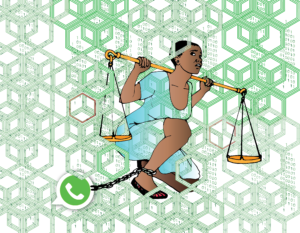
New Initiatives Closing The Response Gaps
Without adequate avenues for victims to report cases, innovative platforms such as the Women At Web Portal that is currently under development hopes to fill the void and make it easy for women victims to report cases of violations online and safely. The portal is being spearheaded under the Women at Web project, an alliance of five organisations, including Chapter Four Uganda, the Collaboration on International ICT Policy for East and Southern Africa (CIPESA), the Defenders Protection Initiative (DPI), Not Your Body and Unwanted Witness. The alliance is working to improve digital literacy and security among African women in Kenya, Tanzania, Rwanda and Uganda.
Brian Byaruhanga from the Defenders Protection Initiative, which is spearheading the development of the portal says the intention is to be able to acquire evidence based on the violations that women are experiencing online, and also make it easy for victims to report cases anonymously and safely.
“The portal will help us in policy advocacy and improve the protection of women online. As it stands now, there is no proper documentation of these cases and yet for advocacy, you need the data,” says Byaruhanga.
The portal will also be used to generate information on the types of violations, where and how they are happening and which categories of women are most targeted. This data, according to Byaruhanga will subsequently be shared with law enforcement agencies such as the Police, to ease their investigations and therefore help victims hold perpetrators to account.
Kukunda from Not Your Body says women need to take lead in challenging social conventions for their own sake. “ Women have to rise above the illusion that being sexual is a sign of immorality. It is one of the reasons they feel ashamed to report even to their friends,” adding that public conversations about these issues is what will help improve awareness and acceptance of women as sexual beings not to be demonised for it.
Support is also paramount. While there are organisations that offer free legal advice to those who cannot afford lawyers, Kukunda says women need to take the initiative to study laws such as the Data Protection Act so they can take action into their own hands.
“Women should never go alone to report a case to a police station or be naive about the system. The system is not ready to help women, nor is it interested,” Kukunda adds.
In Malawi and Uganda, non-consensual sharing of private images has yet to be widely recognized and/or acknowledged as a gendered issue. Consequently, it remains below the radar of most activists and prominent gender advocates. Globally, however, there is growing recognition that digital technology such as email, the social media platforms and mobile phone technologies are being used as a tool to harass, intimidate, humiliate, coerce and blackmail.
This article was first published by the African Feminism on June 18, 2020.
Centre for Human Rights and CIPESA Conduct Study on Civil Society in the Context of the Digital Age in Africa
By Center for Human Rights and CIPESA |
The study on Civil society in the digital age in Africa: identifying threats and mounting pushbacks was undertaken by the Centre for Human Rights, University of Pretoria and the Collaboration on International ICT Policy in East and Southern Africa (CIPESA) to explore the extent of state-sponsored digital challenges that the civil society in Africa is faced with. It illustrates the challenges faced by civil society organisations and the importance of digital security measures.
Considering the digital threats contributing to the shrinking civic space on the continent, the study highlights the international and regional framework governing the activities of civil society. It further maps the national legislative and policy threats against civil society in selected African countries: Egypt, Sierra Leone, Uganda and Zambia. The study shows how these digital threats not only limit the operations and existence of civic society but also impede the enjoyment of human rights such as the freedoms of association, assembly and the right to freedom of expression.
Based on the findings of the study, it is argued that civil society organisations are significant players in the democratic development and protection and promotion of human rights and thus, their operations and rights should be safeguarded. The study, therefore, calls on African governments to respect their obligations under international human rights law and adopt measures that enable civil society to perform their mandate in promoting good governance, accountability and respect of human rights on the continent, especially in the context of the digital age. The study also recommends the civil society to devise methods of countering digital threats. This could be done through the development and implementation of human rights-sensitive organisational data protection, digital security policies and enhanced organisational understanding of how they can harness digital technologies for digital security purposes. Further, the study encourages the private sector and funders to support and complement the efforts by the civil society in advancing digital rights and opening up the civic space.
Civil society in the digital age in Africa: identifying threats and mounting pushbacks
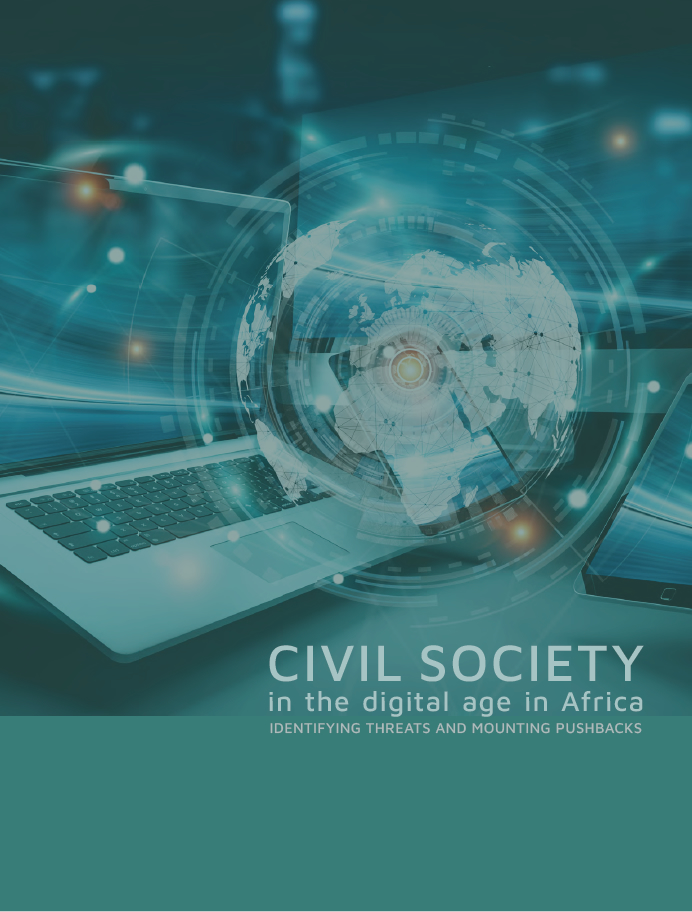
Civil society in the digital age in Africa identifying threats and mounting pushbacks
Silencing Critical Voices: Our Online Civic Space is Shrinking
By Digital Shelter |
Somalia had recorded steady growth in telephone penetration – with 7.6 mobile subscribers. However, internet penetration remains low – 2% as at 2017, according to the International Telecommunications Union (ITU). The adoption of technology has expanded civic space in the post conflict era, with social media platforms and blogs empowering journalists, activists and human rights defenders to document and report human abuses, mobilize public opinion, campaign for reforms, share relevant content and information, and build networks at national and global level.
However, the past three years have seen a rise in threats against online freedom of expression, such as the arrest and intimidation of several journalists and social media campaigners for comments posted on social media. There are reports of dissenting social media accounts being hacked, while others have deactivated their accounts due to fear of attacks. A culture of censorship prevails, amidst a rise in sponsored trolls spreading misinformation and propaganda to counter factual narrative reported by journalists, human rights defenders and activists online.
It is against this background that Digital Shelter hosted a panel discussion on the shrinking online civic space in Somalia and the growing digital threats faced by media professionals, bloggers and human right defenders in the digital space on February 13, 2020. The event was part of series of activities under the theme “Protect our Online Space”, supported by the Africa Digital Rights Fund (ADRF) – an initiative of the Collaboration on International ICT Policy for East and Southern Africa (CIPESA).
Among the panelists was Mohamed Irbad, a prominent blogger and researcher known for his critical writings on governance, human rights, freedom of expression and censorship on social media platforms. In early 2019, after publishing an article titled “Media Censorship In Somalia: A Nation Risk Into Information Darkness” on his personal blog, Mohamed faced serious online and physical threats which forced him to flee the country for six months due to fear for his safety.
“All critical voices, particularly individuals who are based inside Somalia have been silenced with online and physical threats altogether. For instance, when your raise critical issue on Twitter or Facebook you have two options, you either end up battling with anonymous trolls in their hundreds by answering to their toxic comments or you feel intimidated and sacred of writing about certain issues, hence, your remain silenced . And that is exactly what happened to me after writing that article. And therefore, it is fair to stay that we are witnessing the worst shrinking of our online/offline civic and democratic spaces” Mohamed Irbad.
Also speaking at the event was Hassan Ali Osman, a journalist, with the New Humanitarian newsletter. Hassan actively uses Twitter to disseminate local and international news as it breaks for his 90,000 followers. He shared that he has been constantly attacked by trolls merely because of reporting the truth on social media platforms.
 Highlighting the issue of online violence against women was Sucdi Dahir Diriye, a passionate community volunteer and member of CaawiWalaal loosely translated as “HelpYourBrother” – a digital campaign launched three years ago to support local communities affected by droughts in Somalia. As in most of the world, the internet has provided a platform for Somali women to amplify their voices. However, it has also enabled perpetuation of different forms of online violence against women including harassment, doxing, threats, stalking and blackmail, sometimes leading to physical violence. The targets of these attacks are women that are vocal on issues such as gender equality, sexual violence, free expression, or challenging the patriarchal structure of the society. This has created a hostile online environment for women and girls in Somalia, fraught with shaming, intimidation and degrading, leading to withdraw of from the online space.
Highlighting the issue of online violence against women was Sucdi Dahir Diriye, a passionate community volunteer and member of CaawiWalaal loosely translated as “HelpYourBrother” – a digital campaign launched three years ago to support local communities affected by droughts in Somalia. As in most of the world, the internet has provided a platform for Somali women to amplify their voices. However, it has also enabled perpetuation of different forms of online violence against women including harassment, doxing, threats, stalking and blackmail, sometimes leading to physical violence. The targets of these attacks are women that are vocal on issues such as gender equality, sexual violence, free expression, or challenging the patriarchal structure of the society. This has created a hostile online environment for women and girls in Somalia, fraught with shaming, intimidation and degrading, leading to withdraw of from the online space.
As part of her work, Sucdi documents cases of online blackmailing and extortion against young girls in Mogadishu and other regions of Somalia. She stated that limited recognition of the existence of online violence and harassment against women in Somalia is allowing the abuse to continue inexorably. Relevant policies to address online violence against women need to be put in place and more women and girls need to be skilled in digital safety and security.
 Based on their personal and professional experiences, the panelists stressed the need for counter measures against the prevailing threats. Among the recommendations made was increased digital security skills and knowledge building among activists, bloggers and media professionals. Specialized training on gendered online harassment was encouraged. Panelists also emphasized a dual approach in voice amplification – online and offline to reach wider audiences. Furthermore, more stakeholder dialogue to raise awareness on online civic space and digital rights, including data protection and privacy inline with Somalia’s growing technology sector. Other recommendations included research undertakings on current digital threats in Somalia, to inform advocacy and policy interventions; and establishment of a solidarity network to support victims of online attacks.
Based on their personal and professional experiences, the panelists stressed the need for counter measures against the prevailing threats. Among the recommendations made was increased digital security skills and knowledge building among activists, bloggers and media professionals. Specialized training on gendered online harassment was encouraged. Panelists also emphasized a dual approach in voice amplification – online and offline to reach wider audiences. Furthermore, more stakeholder dialogue to raise awareness on online civic space and digital rights, including data protection and privacy inline with Somalia’s growing technology sector. Other recommendations included research undertakings on current digital threats in Somalia, to inform advocacy and policy interventions; and establishment of a solidarity network to support victims of online attacks.
“Digital Shelter is proud to be in a unique position to amplify voices in the most difficult time where the online civic space is shrinking in Somalia”, said Abdifatah, co-founder of Digital Shelter in the closing remarks of the forum.
Digital Shelter continues its “Protect our Online Space” drive during March 2020 with series of trainings on digital security. Digital Shelter is also planning to host other forums on expanding online civic space in Somalia.

This article was first published by the Digital Shelter on March 04, 2020

